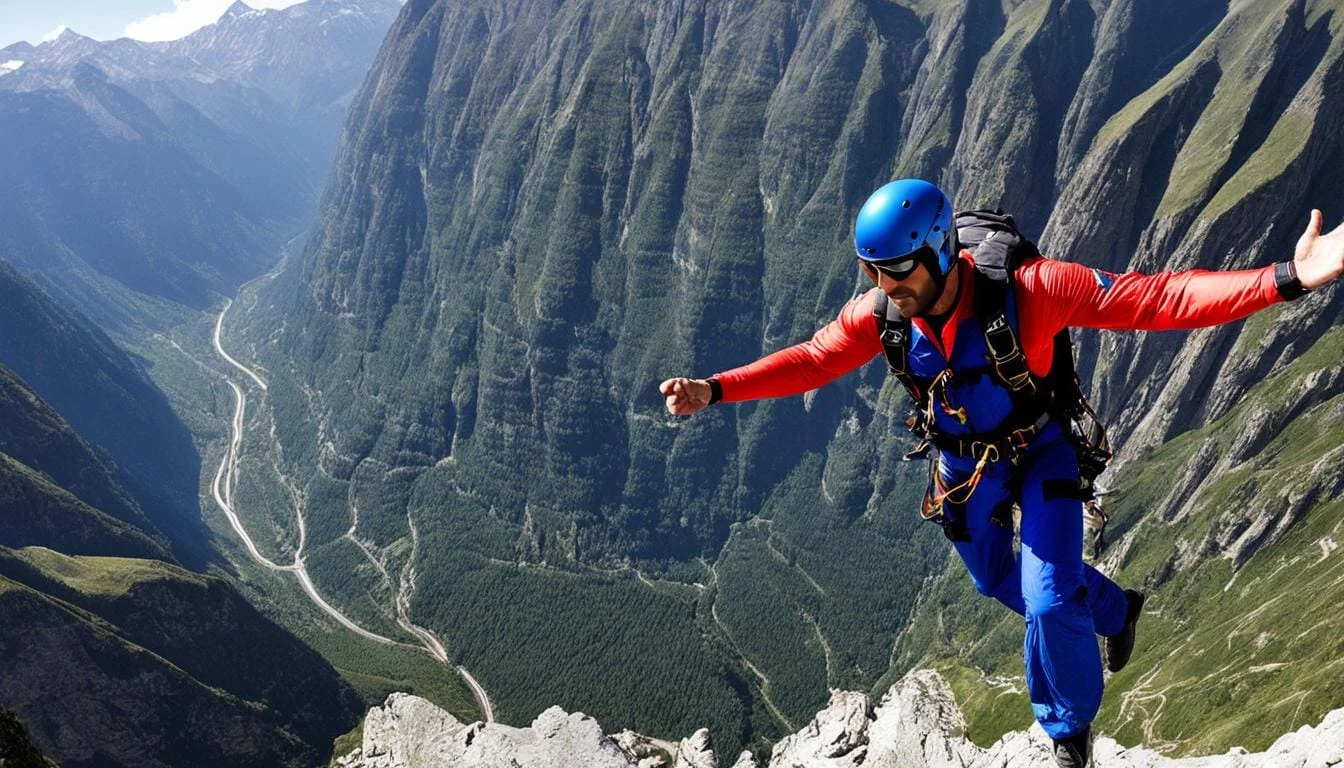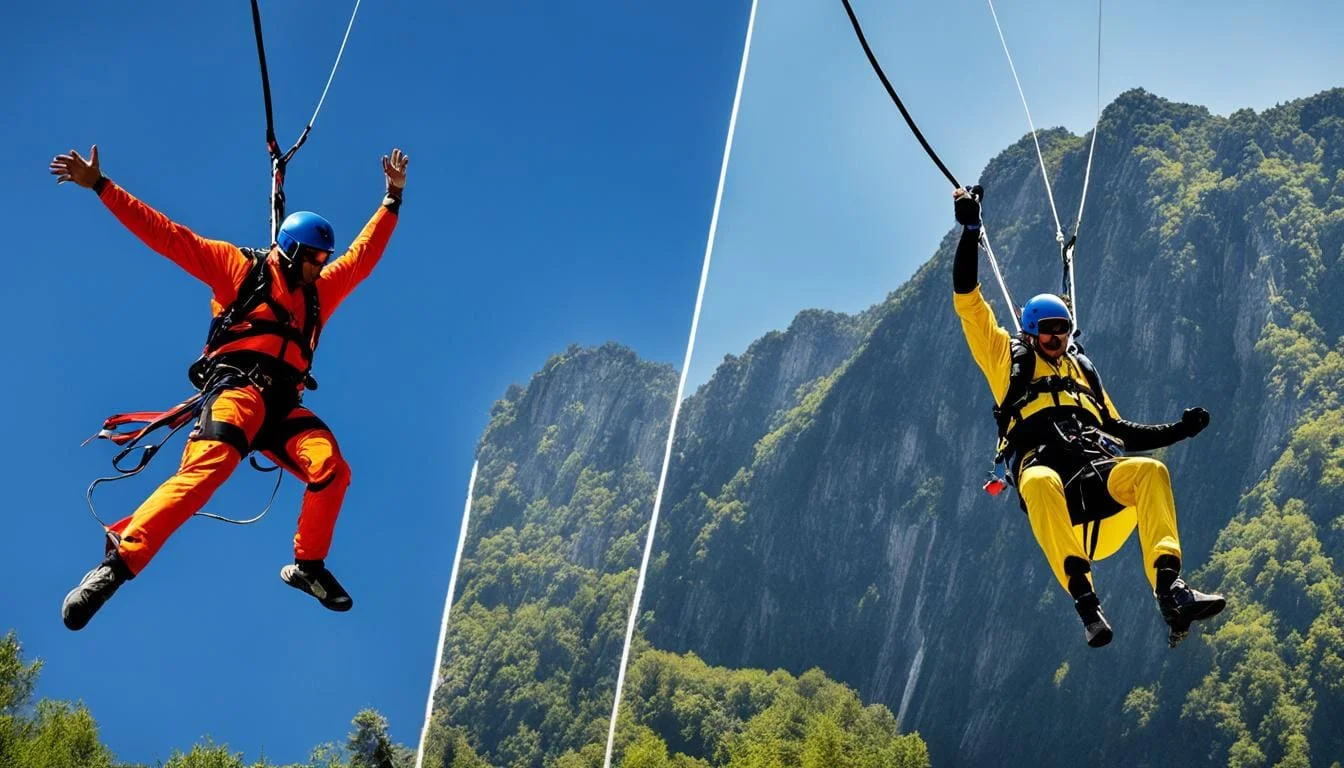Many expectant mothers wonder if they can go paragliding while pregnant, and in this article, we aim to provide you with the facts you need to make an informed decision. In a hurry and want the quick the answer to…
Can You Go Paragliding When Pregnant?
No, it is not recommended to go paragliding when pregnant due to potential risks to both the mother and the fetus. Always consult with a healthcare professional about any physical activities during pregnancy.
Key Takeaways:
Safety Precautions and Guidelines for Paragliding During Pregnancy
Paragliding during pregnancy requires careful consideration and adherence to specific safety precautions to ensure the well-being of both the mother and the baby. While paragliding itself is relatively safe, take-off and landing present risks that should be taken into account. It is important for pregnant women to understand and mitigate these risks before considering paragliding.
First and foremost, it is crucial to consult with a medical professional before engaging in any physical activity, including paragliding, during pregnancy. They will be able to provide personalized advice based on individual circumstances and potential risks.
| Risks | Precautions |
|---|---|
| Overheating | Avoid paragliding in extreme heat and ensure proper hydration. |
| Falls or hitting the baby bump | Wear a secure harness and maintain a safe distance from other paragliders. |
| Diving or sudden directional changes | Avoid aggressive maneuvers and ensure a smooth flight. |
| Take-off and landing | Seek assistance from experienced paragliders for safer take-offs and landings. |
Additionally, it is recommended to fly with an experienced paraglider who has knowledge and expertise in flying during pregnancy. They can provide valuable guidance and support to help minimize risks and ensure a safer experience.
“Paragliding during pregnancy can still be enjoyable and safe if the necessary precautions are taken. It is important to listen to your body, consult with professionals, and make informed decisions that prioritize the well-being of both the mother and the baby.”
While paragliding may not be suitable for everyone during pregnancy, there are alternative sports and activities that can support pregnancy weight and minimize the risk of falls or contact. Always consult with a medical professional to determine which activities are safe and appropriate for individual circumstances.
Remember, the priority should always be the safety of both the mother and the baby. By following guidelines, seeking professional advice, and being aware of warning signs, pregnant women can still engage in physical activities that support their overall well-being.
Potential Risks of Paragliding When Pregnant
While paragliding itself may not pose inherent risks to a pregnant woman, there are certain factors to consider that could potentially compromise the safety of both the mother and the baby. It is crucial to understand these risks and make an informed decision based on your individual circumstances and stage of pregnancy.
One of the main concerns when it comes to paragliding during pregnancy is the risk of falls. Take-offs and landings can be unpredictable, and a fall during these phases of the activity could result in injuries to the mother or potential trauma to the baby. Similarly, sudden directional changes or diving maneuvers during flight can also pose risks.

Overheating is another factor to consider. Paragliding requires physical activity, and the exertion involved can lead to increased body temperature. It is important to monitor your body and ensure that you do not overexert yourself or become overheated, as this can have adverse effects on both your well-being and the baby’s.
| Warning signs during paragliding while pregnant: | Actions to take |
|---|---|
| Chest pains, increased heart rate, shortness of breath | Stop the activity and seek medical attention immediately |
| Decreased baby movements, contractions, fluid leaks, swelling | Stop the activity and consult a medical professional for evaluation |
| Painful calves, dizziness, faint spells | Stop the activity and rest to see if symptoms subside. If they persist, seek medical advice |
It is essential to consult a medical professional before deciding to go paragliding during pregnancy. They can evaluate your specific health condition and provide guidance based on your individual circumstances.
Ultimately, the decision to go paragliding while pregnant should be carefully considered, prioritizing the safety and well-being of both the mother and the baby. It is advisable to explore alternative activities and sports that support the pregnancy weight and minimize the risk of falls or contact. Always remember to listen to your body and consult a medical professional for advice.
The Role of Experienced Paragliders and Professional Advice
If you are an experienced paraglider, seeking guidance from a qualified instructor and professional advice is crucial when deciding whether to continue paragliding during pregnancy. While paragliding itself is relatively safe, the risks associated with take-off and landing make it unsuitable for novice or beginner paragliders, especially during this special time.
Experienced paragliders who have a deep understanding of their own capabilities, as well as the specific risks and challenges posed by paragliding, may choose to continue flying during pregnancy. However, it is important to consider individual skill, confidence, and comfort levels in making this decision.

When seeking professional advice, it is recommended to consult with a qualified instructor who can provide personalized guidance and support. These experts can thoroughly assess your individual circumstances and help you make an informed decision about whether paragliding during pregnancy is appropriate for you.
Additionally, consulting a medical professional is essential. They can evaluate any potential risks associated with your pregnancy and provide specific recommendations based on your health and the stage of pregnancy you are in.
“If you are an experienced paraglider, seeking guidance from a qualified instructor and professional advice is crucial when deciding whether to continue paragliding during pregnancy.”
| Important Considerations: | Recommended Actions: |
|---|---|
| Assess your paragliding skills and experience | Consult with a qualified instructor |
| Evaluate your confidence level and comfort with potential risks | Discuss with a medical professional |
| Understand the specific risks and challenges of paragliding during pregnancy | Seek personalized advice and guidance |
By seeking guidance from experienced paragliders and professionals, you can gain valuable insights to help you make an informed decision about paragliding during pregnancy. Remember, the safety of you and your baby is of utmost importance, so always prioritize your well-being and consult the relevant experts.
Altitude and High Winds
One common concern among pregnant women considering paragliding is whether altitude and strong winds can have an impact on the well-being of the mother and the baby. It’s important to address this concern and provide accurate information to help women make informed decisions.
When it comes to altitude, paragliding is generally considered safe. The altitude itself does not pose a specific risk to the mother or the baby. However, it’s essential to consider other factors such as the physical exertion involved and the overall condition of the mother’s health.
As for strong winds, they can potentially affect the safety of paragliding, regardless of pregnancy. High winds may make controlling the glider more challenging and increase the risk of accidents.

Paragliding companies often have guidelines in place to determine safe wind conditions for flying, taking into account the skill level of the pilot. Pregnant women should consult with the paragliding company to assess whether weather conditions are suitable for flying.
It’s crucial to remember that every pregnancy is different, and individual circumstances may vary. Pregnant women generally shouldn’t paraglide but if you are early on in your pregnancy and have a safe, easy paragliding location, then consider consulting with your healthcare professional.
Consultation with Medical Professionals and Paragliding Companies
Consulting medical professionals, such as obstetricians or midwives, is vital when considering paragliding during pregnancy. They can offer insights into the physical changes and risks during various pregnancy stages.
Paragliding companies and experienced paragliders provide additional guidance, advising on specific precautions based on individual skill and confidence. Every pregnancy is unique; hence, personalized advice is essential to ensure the safety and well-being of both mother and baby.
Recommended Alternatives and Other Pregnancy-Safe Activities
If paragliding is not deemed safe during pregnancy, there are several alternative activities and sports that pregnant women can engage in to stay active and maintain their physical well-being. These activities provide a lower risk of falls or contact, making them ideal for expecting mothers. Here are some recommended alternatives:
| Activity | Benefit |
|---|---|
| Swimming | Improves cardiovascular health, relieves joint pressure, strengthens muscles |
| Prenatal Yoga | Enhances flexibility, reduces back pain, promotes relaxation and calm |
| Walking | Promotes cardiovascular health, strengthens muscles, low risk of injury |
| Stationary Cycling | Provides a low-impact cardio workout, strengthens leg muscles |
| Pilates | Strengthens core muscles, improves posture, enhances overall body strength |
Remember, it’s important to consult a medical professional before starting any new exercise regimen during pregnancy. They can provide personalized recommendations based on your individual circumstances and ensure the activities you choose are safe for you and your baby.
Prioritizing safety and well-being is key throughout the journey of pregnancy, and engaging in suitable physical activities can contribute to a healthy and enjoyable experience.
“Pregnancy is a precious time, and it’s important to engage in activities that support your well-being and the health of your baby. Prioritize safety and consult your healthcare provider to find the best activities for you during this special journey.” – Dr. Sarah Thompson, OB/GYN
Warning Signs and Indications to Stop Physical Activities
It is crucial for pregnant women engaging in physical activities to be aware of warning signs that may indicate potential complications and require medical intervention.
While paragliding during pregnancy is not recommended for novices or beginners, those with experience may still face certain risks. It is important to pay close attention to your body and be aware of any changes that may signal a need to stop or seek immediate medical attention.
| Warning Signs during Physical Activities | Potential Complications |
|---|---|
| Chest pains | Possibility of cardiovascular issues |
| Increased heart rate | Potential strain on the heart and circulatory system |
| Shortness of breath | Impaired oxygen flow to the body and baby |
| Decreased baby movements | Possible fetal distress or complications |
| Contractions | Potential risk of premature labor |
| Fluid leaks | Possible amniotic fluid leakage or rupture of membranes |
| Swelling | Potential indication of preeclampsia or edema |
| Painful calves | Possible deep vein thrombosis (blood clot) |
| Dizziness or faint spells | Risk of falls and impact on the mother and baby |
By recognizing and responding to these warning signs, pregnant women can prioritize their safety and the well-being of their unborn child. It is always better to err on the side of caution and seek professional guidance when engaging in physical activities during pregnancy.
Remember, the health and safety of both you and your baby are the highest priority, and any concerns or warning signs should be taken seriously.
Conclusion

When thinking of paragliding during pregnancy, prioritize safety and make choices based on expert input and personal situations. While paragliding is mostly safe, take-off and landing have increased risks in pregnancy. Beginners are typically advised to avoid this activity.
Doctors warn against activities that may harm the mother or baby, such as overheating or falls. Yet, skilled paragliders have flown during pregnancy. This choice should follow thorough consideration and medical consultation.
Doctors warn against activities that may harm the mother or baby, such as overheating or falls. Yet, skilled paragliders have flown during pregnancy. This choice should follow thorough consideration and medical consultation.
While paragliding during pregnancy isn’t recommended, many other activities support pregnancy health and reduce fall risks. Staying active is essential for expectant mothers’ physical and mental health. Swimming, prenatal yoga, walking, and low-impact exercises with a qualified instructor are safer alternatives.
In conclusion, paragliding whilst pregnant is not recommended, but if you want to pursue it, then safety should be paramount. By consulting medical experts, getting insights from seasoned paragliders, and exploring safer activities, expectant mothers can make choices tailored to their unique situation and comfort.
FAQ’s
Is paragliding safe for pregnant woman?
Paragliding while pregnant is not advised for novice or beginner paragliders due to the risks during landing and take-off.
What are the risks of paragliding when pregnant?
Doctors advise against activities that involve overheating, falls, risk of hitting the baby bump, bouncing or jumping, sudden directional changes, and diving.
Is high altitude during paragliding a concern for pregnant women?
High altitude during paragliding is not considered a concern, but it is recommended to check with the paragliding company and consult a medical professional before flying during pregnancy.
Can experienced paragliders fly while pregnant?
Experienced paragliders have continued to fly while pregnant, but it is a personal decision based on individual skill and confidence. It is important to prioritize safety and consult a medical professional for advice.
What are some pregnancy-safe alternatives to paragliding?
Other sports that support pregnancy weight and avoid risks of falls or contact are recommended.
What are the warning signs during any sport or activity while pregnant?
Warning signs include chest pains, increased heart rate, shortness of breath, decreased baby movements, contractions, fluid leaks, swelling, painful calves, dizziness, or faint spells. It is essential to stop and seek medical attention if any of these signs occur.
Please note that the above list does not include the complete set of questions and answers for the article.





Leave a Reply